Welcome to the vibrant world of Vietnamese markets, where culture comes alive! In this article, we’ll dive into the heart of Vietnam’s essence. Imagine bustling markets filled with color, flavor, and local charm. For travelers seeking an authentic taste of Vietnamese daily life, these markets are your go-to spots. Let’s unravel the magic they hold, providing an irresistible invitation to explore the soul of this beautiful country!
See more: Discover Exquisite Vietnam Destinations
Contents
Top 9 Must Visit Vietnamese Markets
Cai Rang Floating Market
- Location and Heritage: Situated 10 kilometers south of Can Tho’s city center, Cai Rang Floating Market unfolds its vibrant scenes along the Can Tho River at 46 Hai Ba Trung Street, Ninh Kieu District. Originating in the early 20th century, this market has etched its place in history, earning recognition as a national intangible cultural heritage in 2016. It proudly holds the distinction of being voted one of the world’s ten most impressive markets by the esteemed British travel magazine, Rough Guide.
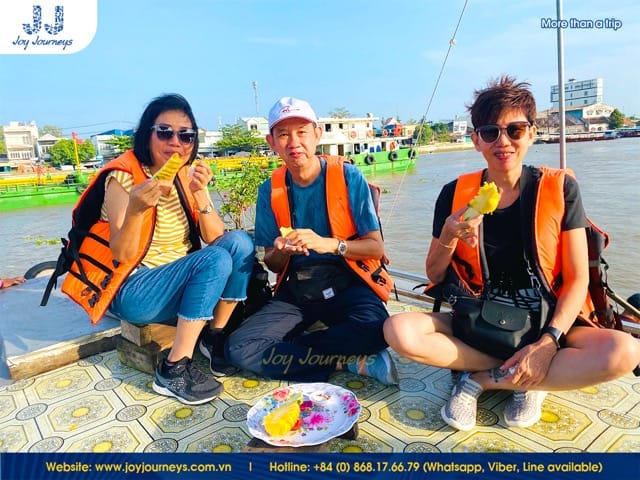
- Historical Significance: Cai Rang Floating Market traces its roots back to a pivotal role as the primary rice purchasing hub for overseas Chinese in the West. Over time, its scope expanded beyond agricultural transactions to encompass the sale of diverse items, including cuisine, household goods, and essentials for river life.
- Market Operations and Ideal Visiting Hours: To truly immerse oneself in the essence of Cai Rang Floating Market, an early start is key. The market comes to life with the bustle of hundreds of boats converging on the river, creating a mesmerizing spectacle. The optimal time to witness this lively scene is from 5:00 a.m. to 9:00 a.m., offering not only the market’s peak activity but also the chance to marvel at the enchanting sunrise on the river – a golden hour not to be missed.
Quirks and Customs of Cai Rang Floating Market
Cai Rang is not just a marketplace; it’s a living, breathing entity with unique customs and practices:
- Hang Whatever You Want to Sell: Boat owners, looking to sell their wares, ingeniously hang them on bamboo trees. Whether it’s bananas, fabrics, or local handicrafts, the items are showcased prominently.
- Hanging But Not Selling: In a display of everyday life on the water, some boats hang clothes. While not for sale, this practice illustrates the intimate relationship between the river and the families dwelling on these floating homes.
- Do Not Hang But Sell: Small boats transform into floating kitchens, offering breakfast dishes like vermicelli, noodles, coffee, and meat sandwiches. These culinary delights cater to both market-goers and sightseers.
- Hang One Thing But Sell Another: An intriguing custom involves boat owners hanging a roofing sheet, symbolically signaling the sale of their boat. This subtle gesture implies that the boat is akin to their house, intertwining their livelihood with the river.
Ben Thanh Market
Nestled in the heart of District 1, Ho Chi Minh City, Ben Thanh Market stands as an iconic symbol of Vietnam’s vibrant culture and bustling commerce. Located on Le Loi Street, Ben Thanh Market is a must-visit destination for tourists seeking a delightful immersion into the local way of life.
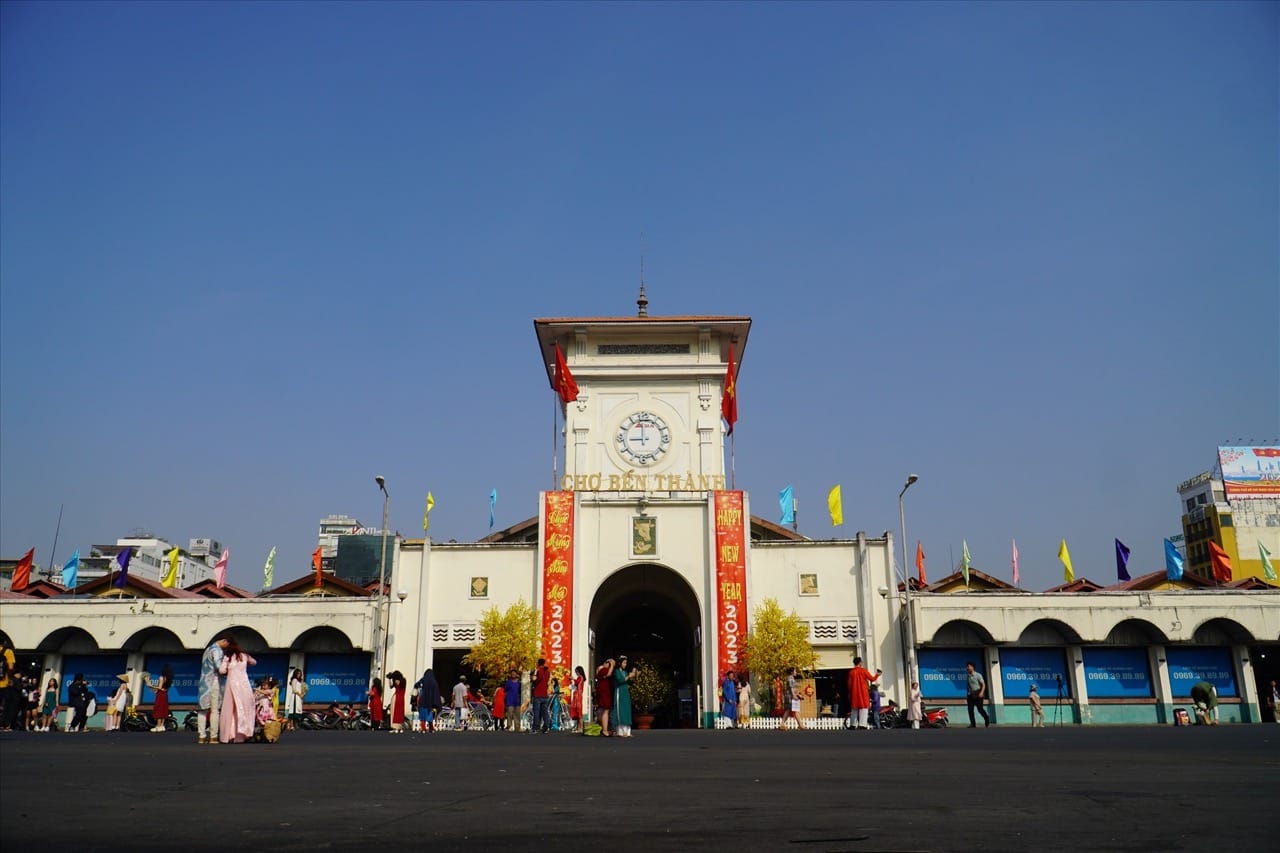
Location and Symbolic Features: Situated on Le Loi Street, the market’s main gate, also known as the South gate, overlooks the Quach Thi Trang square, adorned with a distinctive three-sided clock tower—a visual emblem of the market’s prominence. This South gate becomes a favorite check-in spot for visitors, surrounded by rustic stalls offering fabrics and delectable dry products.
Ideal Visiting Hours: To make the most of the Ben Thanh Market experience, tourists have two ideal time slots. From 7:30 am to 6:00 pm, the market welcomes those eager to explore and shop within its vibrant confines. Alternatively, after 7:00 pm, the market transforms into a nocturnal spectacle, captivating visitors with a lively atmosphere and colorful night stalls.
Market Layout and Main Gates: Ben Thanh Market sprawls across a considerable area, featuring four main gates and twelve side gates radiating in various directions. Each main gate, situated on a different street side, offers a distinct shopping experience.
- The South gate, with its clock tower, entices with fabrics and dry products.
- The East gate on Phan Boi Chau Street lures visitors with vibrant candies and cosmetics, while the West gate on Phan Chu Trinh Street showcases stalls selling shoes, handicrafts, and diverse souvenirs.
- The North gate on Le Thanh Tong Street is a haven for fresh flowers and tropical fruits.
Transportation Options: Getting to Ben Thanh Market is convenient, with three popular transportation options. Bus routes such as 03, 04, 152, 19, 20, 39, 53, 93, and 96 pass near the market, offering quick access. Motorcycles and cars are a flexible choice, with various parking spots available, though visitors are advised to confirm prices beforehand. Taxis provide a hassle-free option, especially for those unfamiliar with Saigon’s streets, ensuring a direct journey to the market’s gate.
Phu Quoc Night Market
Nestled at 6 Bach Dang Street, Duong Dong Ward, Phu Quoc, the Phú Quốc Night Market stands as the epitome of the island’s vibrant nightlife. Merging the charm of Dinh Cau night market and the old Bach Dang night market, this bustling marketplace is the beating heart of Phu Quoc’s evening entertainment, dining, and shopping scene.
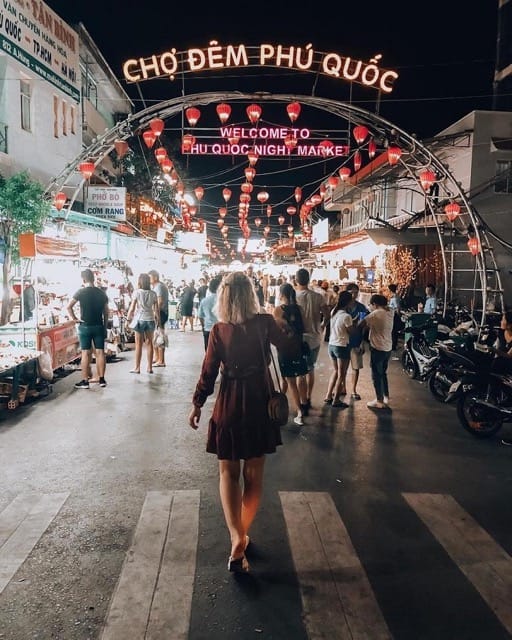
- Location and Atmosphere: Strategically located in the center of the pearl island, Phú Quốc Night Market draws both locals and tourists seeking an enchanting experience. As the sun sets, the market comes alive, offering a lively atmosphere that encapsulates the spirit of Phu Quoc after dark.
- Market Layout: The market is intelligently divided into two dynamic areas, each boasting over 100 diverse stalls. Area 1, positioned at the market’s beginning, is a culinary haven. Here, a myriad of food stalls entice visitors with the tantalizing aroma of fresh seafood, dried specialties perfect for gifting (think fish sauce and dried seafood), and local delicacies like sim wine. Area 2, at the market’s end, transforms into a treasure trove of souvenirs, handicrafts, and exquisite Phu Quoc pearls. This section invites visitors to explore the island’s rich cultural offerings and take home a piece of its unique identity.
- Operating Hours and Timing: Phú Quốc Night Market welcomes visitors daily, operating from 6:00 p.m. to 11:30 p.m. during the winter months. The prime hours, when the market buzzes with activity, typically span from 7:30 p.m. to 10:30 p.m. However, flexibility prevails, and the opening and closing times may vary based on the season, weather conditions, and visitor numbers. It’s essential for visitors to choose an optimal time to fully savor the market’s offerings.
- Tips for Visitors: As the market doesn’t operate overnight, selecting an appropriate time to visit is crucial. Whether you’re a food enthusiast, a souvenir hunter, or someone seeking the vibrant pulse of Phu Quoc’s nightlife, Phú Quốc Night Market promises an unforgettable experience.
Ho Thi Ky Food Market
Nestled on Ho Thi Ky Street in Ward 1, District 10, Ho Chi Minh City, Hồ Thị Kỷ Food Market beckons with an enticing array of flavors, making it a must-visit for food enthusiasts seeking a culinary adventure.
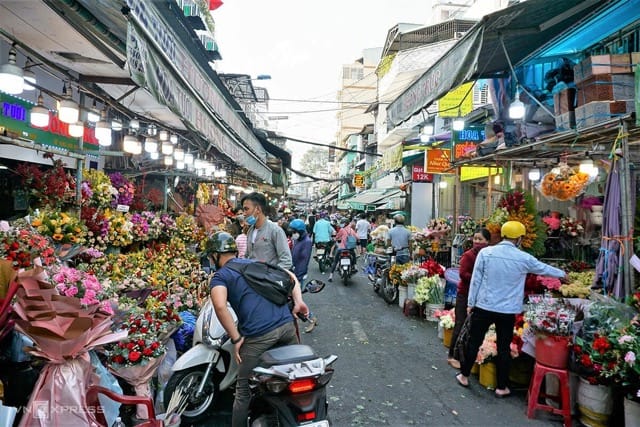
- Location and Opening Hours: Located in the heart of the vibrant District 10, the market springs to life from 3:00 p.m. to 11:00 p.m., providing a haven for food lovers. During holidays, the market takes on a nocturnal charm, operating overnight and allowing visitors to explore the unique rhythms of Saigon’s nightlife.
- A Floral Oasis: Established in 1987 on the outskirts, Hồ Thị Kỷ Market initially specialized in offering an extensive selection of fresh flowers sourced from Da Lat and southwestern provinces. This floral haven allows visitors to own vibrant bouquets, from roses and mimosa to lavender and lotus, at incredibly affordable prices – a mere 3,000 VND per flower stem.
- Culinary Delights Amidst Blooms: Beyond its floral charm, Hồ Thị Kỷ Food Market unfolds as a hidden culinary paradise within the labyrinth of this bustling neighborhood. The market boasts an array of delectable specialties from various regions, creating a gastronomic tapestry that caters to diverse palates.
Visitors can embark on a culinary journey, savoring Vietnamese delicacies, Thai treats, and dishes spanning from European flavors to Asian delights. The market’s layout, with food stalls clustered closely together, provides an immersive experience, allowing patrons to explore the diverse and aromatic world of Vietnamese street food. - Overnight Gastronomic Exploration: What sets Hồ Thị Kỷ Food Market apart is its overnight operation. As the sun sets and the city transforms, this culinary hub continues to buzz with activity, offering a unique opportunity to explore the working life of Saigon’s people at night. The bustling atmosphere, combined with the tantalizing aromas wafting through the air, creates an unforgettable nocturnal experience for food enthusiasts.
Dong Ba Market
Nestled at 2 Tran Hung Dao, Phu Hoa, Hue City, Đông Ba Market stands as a living testament to the rich cultural and historical tapestry of the ancient capital. Dating back to 1887 under the reign of King Dong Khanh, Đông Ba Market has weathered the sands of time, evolving into the largest and oldest market in Hue.
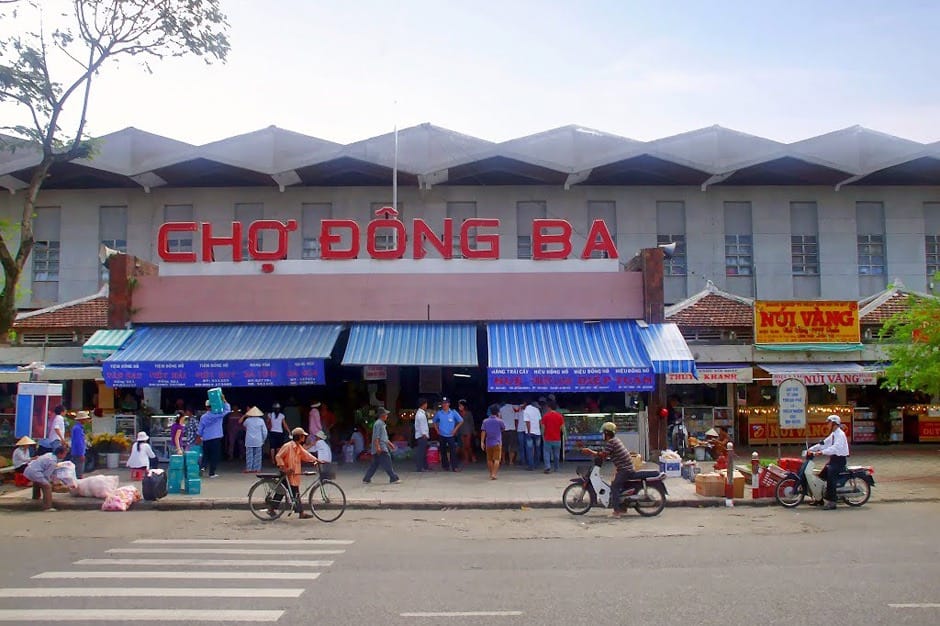
- Location and Operational Hours: Situated on an arterial road in the city center, Đông Ba Market is a bustling hub, constantly thronged with locals and tourists alike. The market, open daily from 5 am to 7 pm, occupies a significant space, stretching nearly 15,600m² from Gia Bridge to Truong Tien Bridge. To explore the market comfortably, visitors are advised to venture after 3 pm when the hustle and bustle subside, allowing for a more leisurely shopping experience.
- Architectural Splendor: The market’s architectural ensemble is crowned by a 3-storey building known as the bell tower, centrally positioned within the market’s expanse. Encircling this iconic tower are rows of houses, creating a U-shaped configuration that cradles the heart of Đông Ba Market.
- Exploration Journey: For an optimal exploration journey, locals suggest starting on the 3rd floor and progressing downward. Each floor unveils a unique array of offerings:
- 3rd Floor: A textile haven, this floor boasts a dazzling array of fabrics and clothing. Whether you seek materials for crafting your ao dai or ready-made garments, this floor is a treasure trove.
- 2nd Floor: Immerse yourself in the world of handicrafts. From candles and urns to poem hats, bamboo and rattan utensils, and pottery, this floor serves as an ideal destination for acquiring souvenirs and mementos.
- 1st Floor: The ground level is a sensory delight for food enthusiasts. Stalls showcase seafood and dried specialties such as fish sauce, dried shrimp, and dried fish. This floor is the go-to place for those looking to bring home a taste of Hue’s culinary treasures.
Hoi An Central Market
Nestled at the crossroads of Tran Phu, Bach Dang, and Nguyen Thai Hoc streets, Hoi An Central Market is a gem in the UNESCO-recognized World Cultural Heritage site of Hoi An’s old town. Open from 6:00 a.m. to 10:00 p.m. daily, the market’s small size belies its ability to cater to every tourist need.
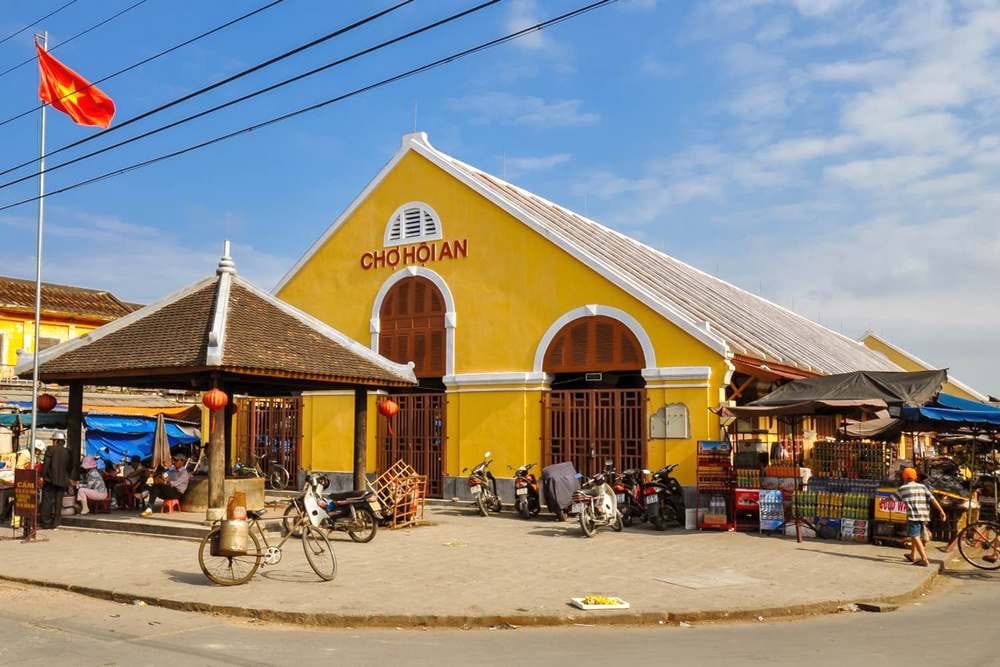
- Architectural Charm: Adorned with mossy tiled roofs and yellow walls, echoing the passage of time, Hoi An Market exudes a rustic charm that captivates visitors. The market’s typical architectural features mirror the simplicity and beauty of the old town.
- Culinary Exploration: Divided into various sections—seafood, vegetables, fruits, souvenirs, and more—the market offers an array of delights. From fresh produce to local specialties, Hoi An Market is a haven for those seeking an authentic taste of the town’s cuisine.
- Friendly Atmosphere: Stepping into Hoi An Market, visitors are greeted by warm and enthusiastic vendors. The friendly ambiance invites relaxed exploration and shopping, a stark contrast to the bustling energy of larger markets.
- Pro Tips for Visitors: To fully immerse in the market’s culture, visit in the early morning for a genuine experience. Explore the vibrant stalls, witness the bustling seafood section, and savor the atmosphere before the day unfolds.
Dong Xuan Market
A spectacle not to be missed is the Dong Xuan night market, held every Friday, Saturday, and Sunday from 6:00 pm to 10:30 pm. Stretching from Hoan Kiem Lake to Hang Ngang, Hang Dao, and Hang Duong, this vibrant market boasts over 4,000 stalls. The night market pulsates with energy, as sellers showcase their wares and buyers immerse themselves in the delightful chaos. Saturday nights bring an additional cultural treat – the Xam singing program, a captivating performance at the market gate, offering a glimpse into the traditional musical heritage of Kinh Ky land.

- Location and Opening Hours: Situated in Hanoi’s Old Quarter, in Dong Xuan ward, Hoan Kiem district, Dong Xuan Market stands a mere 800 meters from the iconic Hoan Kiem Lake. Nestled between Hang Ma street and Long Bien station, the market sprawls with commerce, marking its presence on Dong Xuan alley, Dong Xuan street, Hang Khoai street, and Cau Dong street.
Operating on all weekdays from 6 am to 6 pm, Dong Xuan Market extends its vivacity into the night, with the food court at the market alley operating until dawn the next morning. Notably, on weekends, the market caters to the shopping and strolling desires of tourists until 10:30 p.m. - Market Layout and Goods Areas: Dong Xuan Market unfolds across three floors, each dedicated to specific merchandise:
- 1st Floor: This level hosts stores specializing in clothes, shoes, fashion accessories, and electronics, predominantly sourced from China.
- 2nd Floor: A retail and wholesale haven for adult clothing and fabrics, providing a diverse array of options for fashion enthusiasts.
- 3rd Floor: Catering to the needs of newborns, this floor showcases a variety of items designed for the youngest members of the family.
- Beyond the market’s main building, visitors can explore stalls behind the market, where birds and pets are sold, adding a unique dimension to the shopping experience.
In the Bac Qua Market area, culinary delights come to life. Operating until midnight, this section offers an extensive range of food and culinary stalls, providing a perfect opportunity for visitors to savor local flavors.
Cho Lon Market (Binh Tay Market)
- Location and Opening Hours: Nestled in District 5 of Ho Chi Minh City, Cho Lon Market, also known as Binh Tay Lon Market, stands as a cultural gem within Saigon’s bustling Chinatown. Conveniently located at 57A Thap Muoi, Ward 2, District 6, the market welcomes visitors from approximately 2:00 p.m. to 11:00 p.m. However, for night owls and those seeking a midnight shopping spree, the market’s doors remain open until 2:00 a.m.
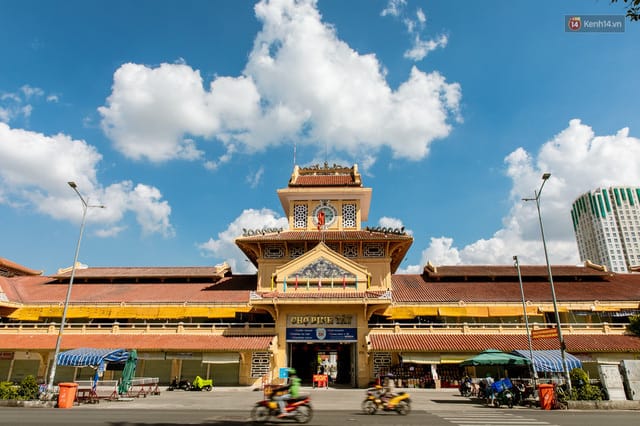
- Architectural Grandeur: Binh Tay Market boasts an impressive eight trigram shape, creating an airy and spacious atmosphere. Comprising 12 side gates and a large entrance opposite Cho Lon bus station, the market’s design prioritizes convenience for transporting goods. The centerpiece of this bustling marketplace is a tall main tower surrounded by clock symbols on all four sides, a visual feast for those entering the market.
- Market Layout and Sections: With a sprawling area of 25,000 square meters, Binh Tay Market hosts a staggering 2,300 stalls, each offering a unique array of products. The market is divided into distinct areas:
- Ground Floor Area: Fronting Thap Muoi street, this section houses stalls featuring Binh Tay market dishes, conical hats, crockery, spices, incense, zinc nails, pictures, bags, shoes, jewelry, and phones.
- First Floor Area: Featuring essential items such as confectionery, groceries, and ready-made clothes.
- Tran Binh Area: Home to groups offering general spices, high-end seafood, tea, coffee, fresh flowers, and fruits.
- Le Tan Ke Area: Primarily hosting dry stalls at Binh Tay market, this section showcases shrimp, dried fish, oils, betel nuts, Da Lat vegetables, pickles, spices, flour, sugar, and more.
- Phan Van Khoe Area: Focused on food items, this section includes beef, pork, shrimp, crab, frog, sea fish, field fish, roasted duck, tofu, and eggs.
- Reasons to Explore Cho Lon Market:
- Abundant Goods: With a whopping 2,300 stalls, Cho Lon Market is a haven for home-based shop owners and small retail markets seeking diverse and unique products.
- Affordable Prices: As a wholesale market, Cho Lon Market offers reasonable prices, making it an ideal destination for Vietnamese shoppers. Bargaining is not only accepted but encouraged to secure the best deals.
- Convenient Transportation: The market’s spacious layout ensures a hassle-free shopping experience. For those wary of carrying their purchases, home delivery services are readily available. Additionally, Cho Lon Market’s proximity to Cho Lon bus station enhances the convenience of transporting goods to various provinces.
Da Lat Market
- Location and Accessibility: Nestled in the heart of Da Lat city at 01 Nguyen Thi Minh Khai Street, Da Lat Market beckons both residents and tourists alike. Its strategic location, merely a 5-minute stroll from Xuan Huong Lake, makes it a central hub for shopping, dining, and immersing in the local culture.
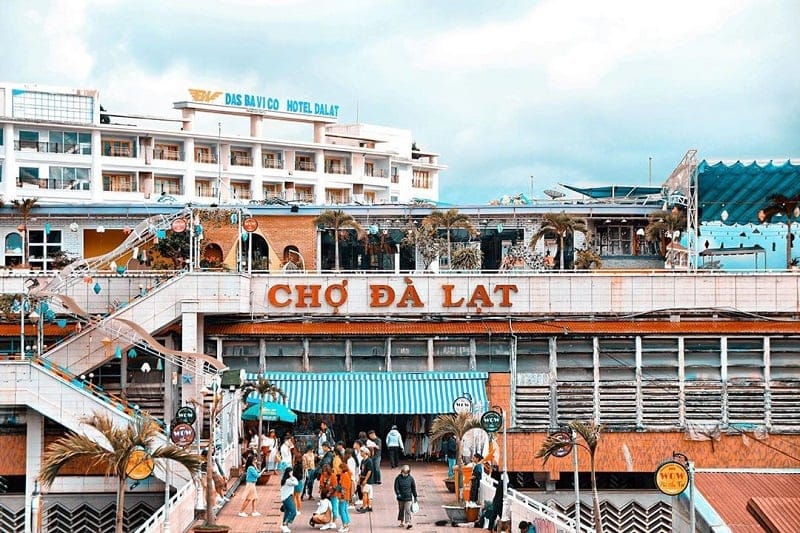
- Operating Hours: Da Lat Market welcomes visitors from dawn until approximately 6 pm daily. However, the specialties area extends its operating hours, catering to tourists until around 9 – 10 pm, or even later. As the sun sets, the vibrant Dalat night market comes to life outside the market premises, offering a unique nocturnal shopping experience.
- Daytime Exploration: The market evolves throughout the day, providing a spectrum of experiences:
- Outdoor Area (Morning to Evening): The outdoor section teems with small stalls showcasing a kaleidoscope of specialties. From vibrant flowers and ornamental plants to an array of dry goods, Da Lat vegetables, and fruits, this area offers a sensory feast. The bustling colors and inviting displays make for a captivating stroll.
- Indoor Area (Morning to Evening): Divided into areas A and B across ground floor, mezzanine, and first floor, the indoor market streamlines shopping experiences. Specific industries find their place here, ensuring convenience for both locals and tourists:
- Ground floor area A: dried goods, fruits, fresh flowers, specialties, confectionery, sausages, printed cakes.
- Ground floor area B: vegetables, rice, general groceries, spices, betel and areca, vermicelli.
- Mezzanine floor B: food and beverage stalls.
- 1st floor, area A: handicrafts, electronics, fabrics, coats, clothes.
- 1st floor area B: cosmetics, bags, shoes, crockery, coats, clothes.
- Night Market Extravaganza: As the day fades into evening, the night market emerges in front of Da Lat market gate, commencing around 5 or 6 pm and reaching its lively peak at 7 pm. Operating until approximately 2 – 3 am, this bustling night market enchants visitors with a myriad of items for sale, the city’s nighttime charm, and the characteristic cool atmosphere that defines Da Lat.
Conclusion
In conclusion, Vietnamese markets stand as vibrant cultural hubs, offering travelers an immersive journey into the heart of the nation. As diverse as the regions they inhabit, these markets reveal unique products, local flavors, and a tapestry of traditions. Encouraging exploration and embracing the lively atmosphere, tourists are invited to savor the authenticity and make lasting memories in the dynamic marketplaces of Vietnam.
Frequently Asked Questions
What is the most famous market in Vietnam?
The most renowned market in Vietnam is Ben Thanh Market in Ho Chi Minh City. Famous for its vast array of products, including clothing, textiles, souvenirs, and local street food, it stands as an iconic symbol of Vietnamese markets.
What is worth shopping from Vietnam?
Vietnam offers an array of treasures for shoppers, including traditional handicrafts, textiles, fresh produce, and unique local specialties. Popular items include silk products, lacquerware, conical hats (non la), and delicious street food.
What type of market is Vietnam?
Vietnam boasts a diverse range of markets, including traditional street markets, night markets, floating markets, and indoor markets. Each type offers a distinctive shopping experience, reflecting the rich cultural tapestry of the country.
Are there wet markets in Vietnam?
Yes, wet markets are prevalent in Vietnam. These markets, known for selling fresh produce, meat, and seafood, are integral to Vietnamese daily life. Visitors can explore the bustling atmosphere and experience the vibrant culinary culture in these wet markets.


Related Posts
Saigon’s “Flower Market Replica”: Where To Find Them
Ho Chi Minh City’s floral charm is not limited to its bustling wholesale markets. Imagine wandering through a place where vibrant petals, fragrant blooms, and the spirit of traditional Vietnamese markets come alive—without the overwhelming crowds. A flower market replica captures that magic, blending the beauty of fresh flowers with the charm of a curated, […]
Is it Safe to Travel to Vietnam Right Now? A Complete 2025 Guide
Vietnam has emerged as one of Southeast Asia’s most captivating destinations, drawing millions of visitors annually with its rich culture, stunning landscapes, and incredible cuisine. However, many travelers still ask: Is it safe to travel to Vietnam right now? This comprehensive guide provides you with everything you need to know about Vietnam travel safety in […]
Ho Chi Minh Cu Chi Tunnels Tour: The Ultimate Guide
The Cu Chi Tunnels stand as one of Vietnam’s most remarkable historical sites, offering visitors a profound glimpse into the ingenuity and resilience displayed during the Vietnam War. For travelers, a Ho Chi Minh Cu Chi tunnels tour represents an essential experience that combines education, adventure, and deep cultural understanding. This comprehensive guide will help […]